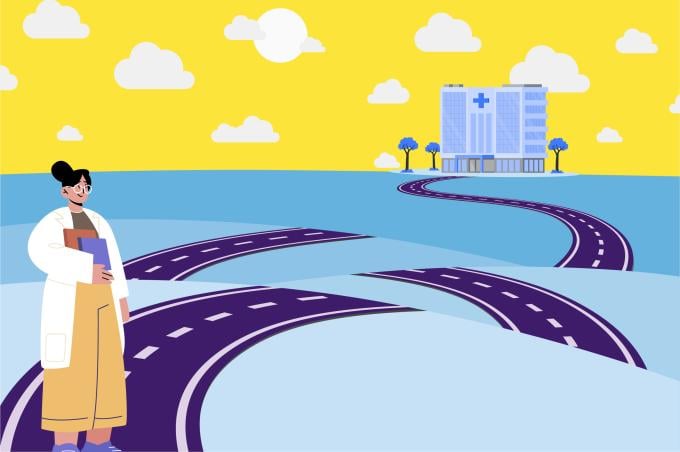For many medical students, Match Day heralds the end of a rigorous academic journey before another begins. Often, medical school graduation and some much-needed downtime are in the near future.
While some medical students have already completed their coursework by Match Day, many others have a month or more remaining in medical school.
Formerly an associate program director, Holly Caretta-Weyer, MD, is now associate dean for admissions and assessment at the Stanford University School of Medicine. She cautioned against falling into senioritis after you match.
“A lot of times people match, and they completely check out,” she said. “Getting some perspective and respecting the transition is really important. It’s a huge change, and you may not realize that until you are actually in it.”
How can you gain that perspective and prepare for that transition? Dr. Caretta-Weyer, an AMA member, offered these tips.
Consider the skills you need immediately
Many medical schools are offering transition-to-residency programs and boot camps.
If your medical school does offer a boot camp or specialty-specific preparation courses, Dr. Caretta-Weyer recommended students take advantage of those opportunities. In addition to that, she said students need to think about the things they will be expected to do without supervision early on in residency and hone those skills.
What medical students transitioning to residency should “be thinking about is how to recognize sick patients and do basic life-support tasks,” she said. “What I often will tell students is if you haven’t done any sort of training in scenarios where there are more potentially unstable patients, you should. Whether that’s in a clinical or simulation setting, it will prepare you for the things you are going to do in residency.”
The AMA helps medical students master the residency-application process so you can successfully match and then ensure you have the skills to thrive as a resident.
Dive deeper:
- Do you have “feedback literacy”? For residency, it’s a must.
- Meet Your Match: Your post-Match Day check list
- So you matched to a residency program—now what?
- 2 huge steps to ease transition from medical school to residency
- The 5 skills residency program directors expect on day one
Get a view of where you stand
To get an accurate assessment of your skills, Dr. Caretta-Weyer recommended an outside perspective, ideally from a faculty member with whom you have worked closely.
“If you have someone who advised you through the undergraduate medical education process or if you have someone in your specialty who knows your ability and is willing to give you an honest picture of your performance, take advantage of that,” said Dr. Caretta-Weyer.
“The key questions in getting feedback are: Can you give me an honest 30,000-foot view of my performance? And would you be willing to meet regularly to talk about this? Any reasonable faculty who is interested in the development of students would be really into that.”
Pursue other medical interests
One beneficial area to brush up on, Dr. Caretta-Weyer said, is your teaching skills; residents add the task of teaching medical students to their new responsibilities. That could mean working as a teaching assistant or even taking an elective on teaching.
“A lot of people are interested in other things, education, administration, quality improvement, social medicine,” Dr. Caretta-Weyer said. “There are so many things out there that students don’t have time to explore, so take some of that idle time to expand some of your skill set.”
Dive deeper:
- Meet Your Match: Making an effective relocation plan for residency
- You made it—will your wallet? How to budget in physician residency
- Why commute time should be a factor in your residency house hunt
Relax
Anyone entering residency needs to make sure to come in with a fresh body and mind.
“I tell all of our incoming residents to take a vacation and spend time with their family and friends,” Dr. Caretta-Weyer said. “Medical school is hard. Residency is harder. We like it when residents come in rested. As an intern, you are spending a lot of time off service and doing things outside of your specialty you don’t choose. So that recharge is important.”
More on transitions in med ed
The AMA’s Facilitating Effective Transitions Along the Medical Education Continuum handbook looks at the needs of learners across the continuum of medical education—from the beginning of medical school through the final stage of residency. This book was published by the ChangeMedEd Consortium.
The learner sections help medical students and resident physicians acclimate to the various settings and expectations in the medical training environment. The faculty sections then provide blueprints for transition programming, as well as resources to help students and residents navigate challenges in transitions. Download the handbook now (PDF).



